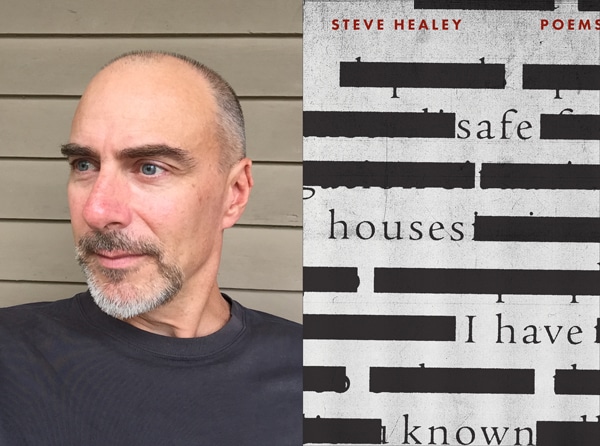Each day leading up to the 32nd annual Minnesota Book Awards announcement, we’ll be featuring an exclusive interview with one of our 36 finalists.

Interview with Steve Healey, author of Safe Houses I Have Known, part of the Poetry category, sponsored by Wellington Management, Inc.
How does it feel to be a Minnesota Book Award finalist?
I’m totally thrilled. I’ve had three books of poetry published as a Minnesota author, and this is my first to be nominated for a Minnesota Book Award, so I’ve had some opportunities to wonder what it would feel like. It’s been even more gratifying than I imagined, especially getting sweet unexpected congratulations from colleagues, friends, and neighbors. I think the local scope of the Minnesota Book Awards gives it a unique intensity because the recognition is coming from my own community, so the honor feels more tangible, less abstract.
Tell us something about your finalist book that you want readers to know?
Safe Houses I Have Known is much more personal than my previous books. It confesses some difficult family secrets about my experience growing up during the Cold War with a father who was a CIA spy. The poems explore how this covert life led to the break-up of my parents’ marriage and to years of pain for all of us, especially my father, who became a reclusive alcoholic and died at age 62.
But I also wanted this collection to reach beyond my own life-story. It tries to confront the terrible history of the CIA, the devastation it has caused for so many people around the globe, especially those with less privilege and power, who had no interest in the conflict between two superpowers. It also looks at the larger American culture of secrecy and paranoia that defined that Cold War era and still influences our present-day surveillance state.
It’s not a happy book, although it can be playful and funny. I hope it offers some compelling—even entertaining—truth about my life and this place we call America.
Share something about your writing process and preferences. For instance, where is your favorite place to write?
I have tinnitus—a constant ringing in my ears—probably due to playing drums in bands when I was younger and (stupidly) not using any ear protection. So when I write, I’m always listening to music to kind of drown out the tinnitus, and the music feels like an integral part of my creative process, carrying me along a journey of sound. I’ve grown fond of a certain kind of new ambient (wordless) music that’s dirtier and more dissonant than the sentimental sounds of rainforests and ocean waves. Among my favorites are William Basinski, Federico Durand, and Black Brunswicker.
I also feed my poetry process by reading a lot of work by other poets. Reading helps me see differently, generate new language, ideas, images, structures. My favorite poets have always been those whose poetry makes me want to write my own poems. Safe Houses I Have Known owes a lot to poets like Kaveh Akbar, Laura Kasischke, Mai Der Vang, Matthew Rohrer, Alexandria Peary, Mary Ruefle, Solmaz Sharif, Sandra Simonds, and Terrance Hayes.
Minnesota has a reputation as a state that values literature and reading. In your experience, what is it about our state that makes it such a welcoming place for writers and book creators?
Maybe the too-obvious answer is the cold—how it forces us inside our homes and inside our minds.
I’d also say that literacy has a political dimension. People in Minnesota have developed a culture of political engagement, seen—for example—in our high voter turnouts and high rates of volunteerism. Reading and publishing are political acts, and they tend to thrive where people are politically aware and active. Of course, Minnesota also has a history of denial about our serious social problems, but I’d like to believe that our passion for literacy will help us keep moving toward social justice and equity.
What is something you are good at that few people know about?
This may sound weird, but I do this thing with cats—I put them into a kind of blissed-out paralysis by easing them onto their back in my lap and massaging their armpits and shoulders in this certain way so their forelegs stretch straight over their heads in a position of total surrender. I can often get even cranky cats to relax into a furry puddle of purrs. I learned this trick with my own super cranky cat named Girl, who died recently after 18 years of hissing (although I loved her dearly).
What do you love about libraries?
I love that they have real books in them, with pages full of words that you can touch with your fingers and read with your eyes.
I also love how libraries have stepped up to meet the changing needs of their communities. Our neighborhood library is the Rondo Community Library in St. Paul, and we visit it with our kids almost every week. It’s really impressive what goes on there, beyond just lending library materials and providing internet/computer access. There are all kinds of activities and resources for children, from story times to science camps to craft classes to homework help. For adults there are GED and ESL classes, help for tax preparation, community meetings, and so on. Libraries seem to recognize that free public collective spaces have become increasingly endangered—they’re doing amazing work to fill the void, and we need to support them.
Steve Healey is the author of two previous books of poetry, 10 Mississippi and Earthling. He is a professor of English and creative writing at Minneapolis College.

